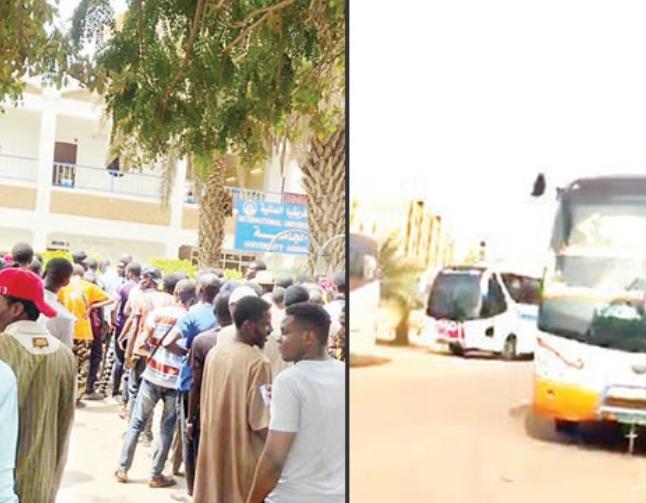…said we might face the war again
Nigerians are currently stranded on the journey from Khartoum to Cairo after the drivers of the buses paid to evacuate them complained that their fuel finished and that Federal Government has not remunerated them for the service.
As of the time of filing this report at 2:20 pm, our correspondent gathered that none of the Embassy officials are on the ground to explain to stranded Nigerians, especially the students why the drivers have stopped the buses over their claim.
The PUNCH reports that the evacuation of 2,400 students and other Nigerians trapped by the ongoing conflict in Sudan took off on a slow start on Wednesday as only 15 out of the 40 buses required for the exercise were provided.
Although the Federal Government hired 40 buses for the repatriation of the citizens from Khartoum and other cities to Egypt, only 10 buses were available as of Wednesday morning, while additional five buses were provided later in the day (Wednesday).
READ ALSO: Sudan Conflict: Trapped Nigerian Students Yet To Take Off To Cairo
Speaking with The PUNCH on Thursday, some students fear that the three-day ceasefire declared by the Sudanese armed forces and the Rapid Support Force expires Thursday (today) and they are yet to make buses available.
The Chairman of the Nigerian Community (Elders Forum) in Sudan, Dr Hashim Na’Allah, stated “People are hungry and there is no concrete information from either the Embassy or the Committee in charge of the buses.
“People are sitting outside under high temperatures. The temperature is very high that people are thirsty. Nowhere to find water to drink or buy food to eat.
“In the next two to three days, if nothing is done to address this situation, Nigerian students might start dying.”
A female student who spoke on anonymity noted, “We are 150 females mostly from Jigawa and we are stranded. The Embassy said they are not sending buses to us.
READ ALSO: Sudan: Ethiopia Blocks Fleeing Nigerian Students, Factions Agree 72-hour Ceasefire
“The bus owners have been complaining that they do not have fuel but we are not even seeing the buses. They are not ready to release any of the buses because people are running away from the country.
“Today is the last day of the ceasefire. We woke up to gunshots this morning. If we do not leave here today, I do not know what becomes of us.”
In a video sighted, a student was seen crying and saying “Because your family, children, and nephews are on the bus, that is why we are left behind. We are afraid. We do not have water, hunger, and food. These soldiers, their barracks are very close to us here, (International University of Africa). There have been gunshots since last night. No one is here for us.”
The President of the Jigawa State Students Association in Sudan, Umar Abubakar said he has been out since 5 am waiting for a bus to evacuate them.
READ ALSO: Relief As Sudan’s Rival Factions Agree To three-day Ceasefire
Abubakar noted, “We are disappointed in everything. We are outside under the sun since 5 am waiting for the buses, not even one official from the embassy is around. Those people are just playing us along.”
He added that those who were evacuated from Khartoum to Egypt have been stranded since yesterday (Wednesday) at a border between Sudan and Egypt.
Abubakar said, “Even those that left for Egypt yesterday are now stranded on their way because the drivers said they have not been paid and that they are not moving an inch until they are paid, or else they will drop the students there and return.”
Confirming this, a student of Noble College in Sudan, Idris Wakama, said “The drivers dropped our students in the middle of the desert. We do not know what is happening. They collected $100 from some of our students on the buses. The Federal Government needs to address the situation quickly.”
In a video obtained by our correspondent, students were stranded long frustrated in a quiet and desert environment.
A female was seen yelling, “Before we started this journey, we fought and now that we have the privilege of moving, the drivers dropped us in the middle of this desert. We have been stuck here for five hours.
“We do not have money nor water. We are in an unknown environment and it is very dangerous.”
